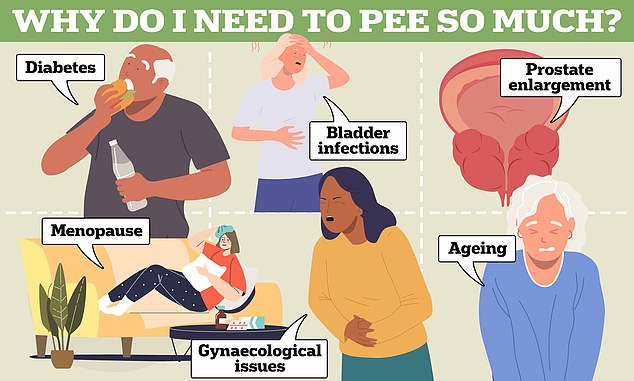Are YOU weeing too much? How to tell something might be wrong… and what it might mean
Most people – especially as they get older – have had to urinate more often than normal at some point.
And there's usually a simple explanation, like drinking too much fluid.
But what if having to pee a lot is an ongoing problem? Do you just accept it – perhaps labeling it as an inevitable part of growing older – or should you have it checked out by a doctor?

Most people – especially as they get older – have had to urinate more often than normal at some point. However, it could be a sign of a problem such as diabetes, bladder infections and an enlarged prostate (shown in the image), says Dr Babak Ashrafi of Superdrug Online Doctor.
'Concern about increased urination frequency is something often expressed by patients and can be distressing,' says Dr Babak Ashrafi of Superdrug Online Doctor.
'It is important to know that an increase in the need to urinate can indicate a range of problems, so it is wise to seek advice from a healthcare professional.'
What could those problems be?
Diabetes
Dr. Ashrafi said: 'Diabetes can cause you to urinate more often due to increased blood sugar levels [glucose] levels.
'The kidneys work to eliminate excess sugar through the urine, leading to increased thirst.'
According to Diabetes UK, the urge to drink more comes from the body becoming dehydrated as a result of this process.
So if you suddenly have to urinate more and are also very thirsty, Dr. Ashrafi says it's a good idea to have your blood sugar levels checked.
Other signs of diabetes may include “unexplained weight loss and fatigue.”
Infections
Infections such as cystitis irritate the bladder and urethra, causing you to urinate frequently and urgently.
Dr. Ashrafi said additional signs of cystitis include pain or a burning sensation during urination, as well as cloudy or strong-smelling urine.
Mild, short-lived urinary tract infections can sometimes go away on their own, especially if you stay well hydrated.
But Dr. Ashrafi recommends seeing a doctor if it's the first time you're experiencing these symptoms; they do not worsen or go away after a few days.
In addition, he recommends seeking medical attention if you notice an increase in pain and other worrying symptoms, such as fever or a general feeling of being unwell.
Anyone who notices blood in the urine should see their doctor.
Prostate enlargement
Benign prostate enlargement (BPE) is very common in men over the age of 50, although it can occasionally affect younger men.
Prostate Cancer UK (PCUK) insists it is not caused by cancer and does not increase the risk of developing the disease.
It basically means that the prostate – a small gland about the size of a walnut, located between a man's bladder and rectum – has increased in size, which can cause men to feel like they need to urinate more, especially at night.
PCUK says around a third of men over 50 have urinary tract symptoms, and the most common cause is BPE.
'Prostate enlargement can obstruct the urethra, causing difficulty in starting or stopping urination and resulting in weak urine flow, which then contributes to an increase in urination frequency,' said Dr Ashrafi.
The good news is that BPE can be controlled – you don't have to just accept it. GPs can assess whether further research needs to be done.
Menopause
Many women going through menopause report that they need to urinate more urgently, and the NHS reports that around 70 percent of women say their urinary incontinence started after their last period. This is related to a depletion of estrogen in the urinary tract and vagina.
“Menopause brings hormonal changes that can affect the urinary system,” said Dr. Ashrafi.
'Vaginal dryness, hot flashes and mood swings may be associated with increased urinary frequency.'
Gynecological problems
Gynecological problems can also be accompanied by the need to urinate more.
Dr. Ashrafi said, 'Another reason for increased urination in women can be gynecological problems such as pelvic pain, abnormal bleeding and discomfort during intercourse.
'These can lead to changes in bladder function, resulting in an increased urge to urinate.'
Dr. Ashrafi recommends keeping track of your symptoms and contacting your doctor. You may need further tests to rule out underlying causes, as well as advice on how to manage the symptoms.
Pelvic floor problems
Weak or damaged pelvic floor muscles – the muscles that span the pelvis of the pelvis – can lead to increased urination in both men and women.
Dr. Ashrafi said: 'Pelvic floor problems, such as weakness or dysfunction, can result in incontinence and difficulty controlling bowel movements.
'These problems can contribute to an increase in urination frequency.'
For women, this may be related to childbirth, age and hormonal changes.
But it can potentially affect anyone – it can also be the result of injury or other health problems.
Simple pelvic floor exercises have been proven to help. Dr. Ashrafi recommends speaking to your GP or physiotherapist for advice.
Aging
Dr. Ashrafi said: 'Aging can lead to gradual changes in bladder function, resulting in reduced bladder capacity and weakened pelvic muscles.'
He said this can then 'contribute to increased urination frequency'.
